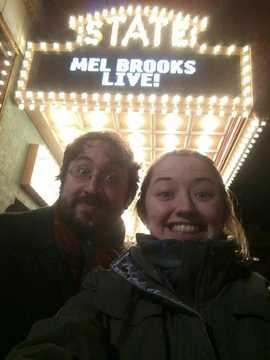 I’ve had the great fortune to come face-to-face with many of the contemporary creative minds that I admire: I met Brian Jacques at a book signing when I was thirteen, Shara McCallum held a poetry reading at Juniata when I was a student there, I had a drink with Sir Terry Pratchett while I was pursuing my Master’s (he was a guest lecturer in my program), and last year I attended a talk by Neil Gaiman. On Friday night, thanks to the generosity of my aunt and uncle, my cousin and I attended a screening of Blazing Saddles, which was followed by a live Q&A with Mel Brooks himself. I wasn’t sure what to expect from seeing Brooks in person. It’s hard to know what to expect from a man whose career has been defined by writing and portraying zany characters (Peter Sellers, for instance, claimed that he had no identity outside of his characters, and Gene Wilder often insisted that he wasn’t funny). What I got was two hours of storytelling and musing from a man who was energetic, enthusiastic, witty, and honest. It didn’t feel like a performance--even in an auditorium of hundreds, it felt like an ordinary conversation. He was simply himself, without pretense. More than once, he chided himself for having said something without thinking, and sternly told his audience that his comments were not to leave the theater--”if anybody asks, just say, ‘he was good’” was the repeated plea. In a recent lecture, I told my students that one of Shakespeare’s most appealing aspects is his ability to seamlessly blend the high with the low; his plays are filled with wordplay, witticisms, and references to classical literature and myth, but also rife with double entendre and toilet humor. Much the same can be said about Brooks. True, Shakespeare’s work covers a greater range of genre and form, but part of the enduring appeal of Brooks’s work is the presence of both high and low content. It’s why Max Bialystock can slap Leo Bloom one moment and reference Dostoyevsky the next. It’s why Blazing Saddles can contain a lengthy farting sequence and still provide provocative commentary on racism. Shakespeare used his plays to express universal human experiences, and remind audiences that a king is no less susceptible to ruin than a fool, a fairy queen no more immune to love than a mortal. Brooks reminds his audiences that no one should be immune to parody, and that joy and laughter can always triumph over racism, oppression, and hate. Even Adolf Hitler, a universal figure of the worst parts of mankind, can be made an object of laughter. I wouldn’t consider my own work satire. I labor too long over my words to be truly funny. But Brooks’s worldview has definitely impacted my own. While his intent in lampooning Hitler was to bring the dictator down, to remove the fear and hate that his name still inspires and replace it with laughter, his parodies are, for the most part, born out of love. His love of what he called “dopey Westerns” during the Q&A allowed him to make Blazing Saddles. His reverence for Hitchcock gave direct rise to High Anxiety. His films show that it is indeed possible to have fun with and even criticize something while still respecting it. It’s that attitude that allowed me to write Morningstar Ascendant, and to a greater extent led to the project that I’m currently working on (more on that another time), and I think it’s an attitude that, like his films and like the man himself, serve only to brighten the world. It is, indeed, good to be the king. Long may he reign. P.S .- Incidentally, if anyone knows how I can track down Philip Pullman, Margaret Atwood, J.K. Rowling, Susan Cooper, or Guillermo del Toro, do let me know.
0 Comments
|
AuthorWriter, professor, occasional ruminator Archives
October 2018
Categories |
 RSS Feed
RSS Feed